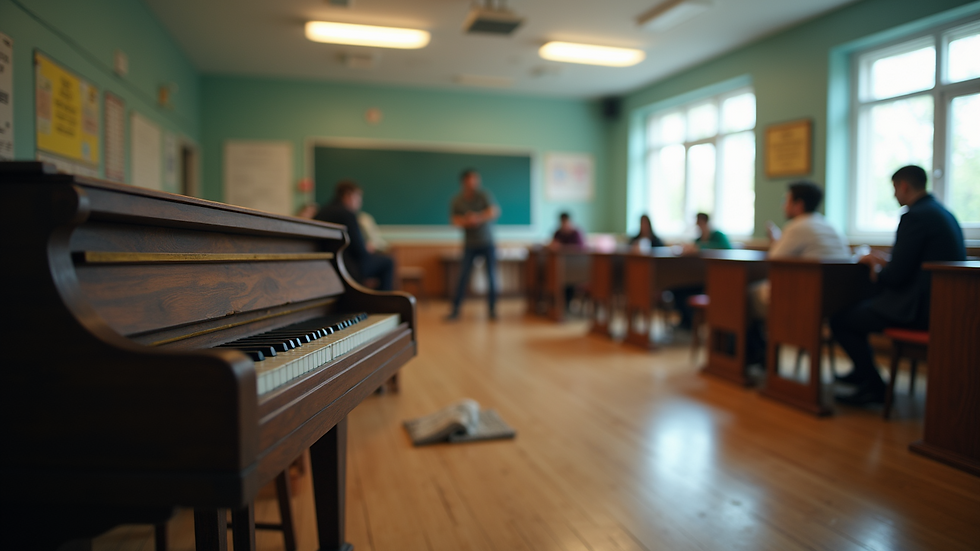Unlock the Benefits of Music Lessons
- Ruban
- Oct 1, 2025
- 3 min read
Learning to play an instrument or improve your singing can be one of the most rewarding experiences. It brings joy, builds skills, and opens doors to new opportunities. Whether you are starting from scratch or want to sharpen your talents, music lessons offer a clear path to growth. I want to share why taking music lessons can be a great choice for anyone, no matter their age or skill level.
Discover the Benefits of Music Lessons
Music lessons do more than teach you how to play notes or sing songs. They help develop your mind and body in many ways. For example, learning an instrument improves your coordination. You use your hands, eyes, and ears all at once. This kind of practice strengthens your brain’s ability to multitask.
Music also boosts memory. When you learn a new piece, you remember patterns and sequences. This mental exercise can help with other areas of life, like school or work. Plus, playing music encourages creativity. You get to express yourself in a unique way, which can be very satisfying.
Another benefit is confidence. As you improve, you feel proud of your progress. Performing in front of others, even just family or friends, builds courage. It teaches you how to handle nerves and enjoy the spotlight.
Finally, music lessons offer social benefits. Joining group classes or ensembles helps you meet people with similar interests. Making music together creates a sense of community and teamwork.

How Music Lessons Fit Into Your Life
Fitting music lessons into your busy schedule is easier than you might think. Many schools and teachers offer flexible times, including evenings and weekends. You can choose in-person or online lessons depending on what suits you best.
Starting with short sessions, like 30 minutes, can keep things manageable. As you grow more comfortable, you can increase the length or frequency. The key is consistency. Practising a little every day helps you improve faster than long, irregular sessions.
Setting clear goals also helps. Maybe you want to learn a favourite song, prepare for a recital, or simply enjoy playing for fun. Sharing these goals with your teacher ensures your lessons stay focused and enjoyable.
Remember, music lessons are for everyone. Children as young as five can start learning simple instruments or singing. Adults can pick up new skills or revisit old passions. There is no age limit to enjoying music.

What Course Is Best for Music?
Choosing the right course depends on your interests and goals. Some people prefer classical training, which focuses on technique and reading music. Others enjoy contemporary styles like pop, rock, or jazz, which often include improvisation and playing by ear.
If you are unsure, many schools offer trial lessons or beginner courses. These give you a taste of different styles and instruments. You can explore piano, guitar, drums, voice, or even less common instruments like violin or ukulele.
Group classes can be a fun way to start. They provide a supportive environment and allow you to learn alongside others. Private lessons offer more personalised attention and faster progress.
Look for courses that balance theory and practice. Understanding music basics like rhythm, scales, and chords helps you become a well-rounded musician. But hands-on playing is just as important.
At Joyful Sound School of Music, for example, courses are designed to be accessible and enjoyable. They cater to all ages and levels, making it easy to find the perfect fit.

Tips to Make the Most of Your Music Lessons
To get the best from your lessons, try these simple tips:
Practice regularly - Even 10-15 minutes daily makes a big difference.
Stay patient - Progress takes time, and mistakes are part of learning.
Ask questions - Your teacher is there to help you understand and improve.
Record yourself - Listening back can show your strengths and areas to work on.
Enjoy the process - Focus on the joy of making music, not just the end result.
Creating a dedicated practice space at home can also help. Keep your instrument accessible and free from distractions. Use a metronome or apps to keep time and track your progress.
Remember to celebrate small wins. Learning a new chord, mastering a song section, or performing for someone are all achievements worth recognising.
Embrace the Joy of Music Today
Music has the power to brighten your day and enrich your life. Taking music lessons opens the door to this wonderful world. It builds skills, confidence, and friendships. Whether you want to play for fun or pursue music seriously, lessons provide the guidance you need.
If you are ready to start or continue your musical journey, consider joining a school that values accessibility and personal growth. With the right support, you can unlock your full potential and enjoy every note you play.
Start today and discover how music can bring happiness and meaning to your life.




Comments